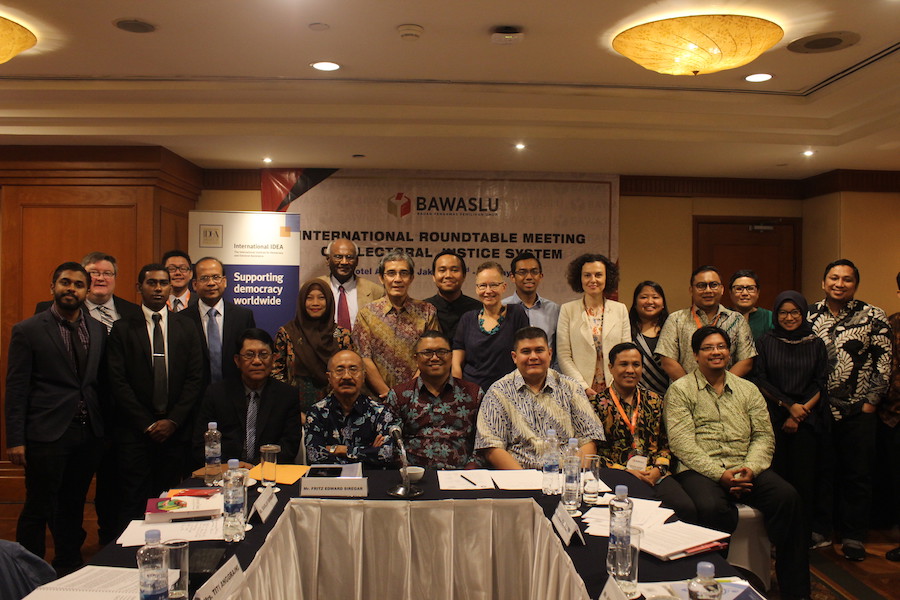A Brief Colonial History Of Ceylon(SriLanka)
Sri Lanka: One Island Two Nations
A Brief Colonial History Of Ceylon(SriLanka)
Sri Lanka: One Island Two Nations
(Full Story)
Search This Blog
Back to 500BC.
==========================
Thiranjala Weerasinghe sj.- One Island Two Nations
?????????????????????????????????????????????????Sunday, May 6, 2018
A Sound Electoral Justice System For Sri Lanka
Electoral Justice Defined
 I
was privileged to represent Sri Lanka at the International Roundtable
Meeting on Electoral Justice, 2-3 May, 2018 in Jakarta. It was organized
by the Election Supervisory Board of the Republic of Indonesia.
I
was privileged to represent Sri Lanka at the International Roundtable
Meeting on Electoral Justice, 2-3 May, 2018 in Jakarta. It was organized
by the Election Supervisory Board of the Republic of Indonesia.
What indeed is Electoral Justice? We manage elections by certain rules.
As developed at the meeting, ours is a human endeavor. We human actors
who design, administer and participate in the electoral process will
from time to time violate electoral norms. In these circumstances, the
capacity of a damaged electoral process to be repaired, punish
wrongdoing through the fair resolution of disputes, the just sanctioning
of crimes and other illegal activity, and the correction of
irregularities is the process of restoring electoral justice.
An Electoral Justice System, EJS, as defined by The International
Institute for Democracy and Electoral Assistance (IDEA), is the means or
mechanisms to ensure and verify that electoral actions, procedures and
decisions comply with the legal framework and to protect and restore the
enjoyment of electoral rights. An EJS is a key instrument of the rule
of law, and the ultimate guarantee of compliance with the democratic
principles underlying free, fair and genuine elections.
The lead speakers Frank McLoughlin and Therese Pearce-Laanela of IDEA,
and Prof. Carla Luis and Dr. Fritz Siregar of the Portuguese and
Indonesian Election Commissions respectively, put together the features
of an ESJ. These are ensuring that each action, procedure and decision
is in compliance with the legal framework, protecting electoral rights,
and giving people who believe their electoral rights are violated the
opportunity to file a challenge, be heard and receive a ruling.
Sri Lanka – Time Sensitivity?
In Sri Lanka we have almost perfected the art of administering elections
while paying little heed to whether we have a vibrant EJS. The EJS
process needs to be time sensitive, resolving issues quickly. Clearly,
our Sri Lankan system failed this test in the Geetha Kumarasinghe case
where the matter dragged on through the courts for 2 years before
resolution. For that time, a person purporting to be an MP drew her
salary and other benefits, and represented the people of her electoral
district. Similarly at the local government elections, we had many
candidates who were ineligible for the reason of being unqualified to
register in the relevant ward. Yet, the Commission could not reject
their illegal nominations. This is because the Supreme Court has ruled
that the Returning Officer cannot reject papers except for the short
list of reasons given in the election laws. We must therefore let them
contest, and if they are elected, let the complainant file a case and
wait for two years or more to get a verdict. As the matter plays out,
some 13 members of the Maharagama Council who are not from within their
wards (but were elected because we could not reject their nomination
papers) allegedly sent the Commission their resignations. Subsequently
however the elected members said they had never sent those letters. It
is a mess that defies resolution. The people of those 13 wards lose
because there is no effective EJS.
Supreme Court: Infallible?
If we had a proper EJS, we would re-canvass the Supreme Court decision saying that because the Election Commission under the constitution has the duty to uphold all election laws, we must be allowed to reject papers for reasons other than those explicitly listed as reasons for rejecting nominations. This situation where the Commission accepts a clearly wrong Supreme Court decision shows there is no EJS. Surely, a Commission must be confident of its reasoning, no matter what the Supreme Court says, and be prepared to argue its views before the court or parliament rather than feeling inferior to challenge the Supreme Court.
If we had a proper EJS, we would re-canvass the Supreme Court decision saying that because the Election Commission under the constitution has the duty to uphold all election laws, we must be allowed to reject papers for reasons other than those explicitly listed as reasons for rejecting nominations. This situation where the Commission accepts a clearly wrong Supreme Court decision shows there is no EJS. Surely, a Commission must be confident of its reasoning, no matter what the Supreme Court says, and be prepared to argue its views before the court or parliament rather than feeling inferior to challenge the Supreme Court.



